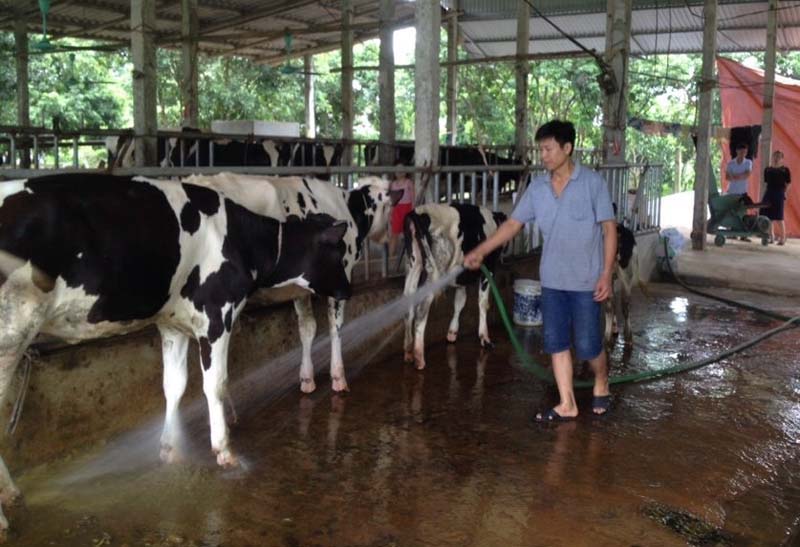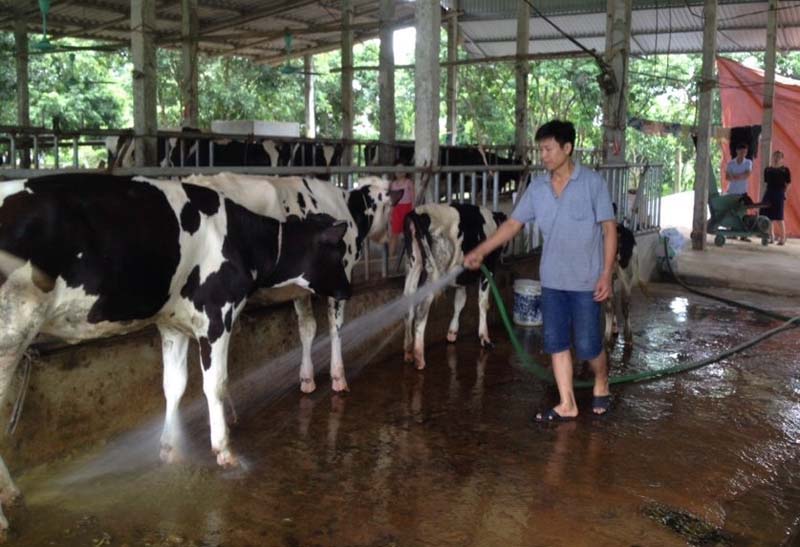
(HBO) – Visitors to Co Nghia commune, Lac Thuy district, the northern mountainous province of Hoa Binh, will be surprised at changes in the locality since it was recognised as a new-style rural area three years ago. Roads connecting hamlets and public facilities have been built. Besides, production models have brought about high economic values, helping local residents have stable jobs and improve their living standards.

Cow farm of Nguyen Van Xuan’s
family in hamlet 2A, Co Lac commune, Lac Thuy district, generates 700 million
VND per year.
Co Nghia is the model commune in new-style rural area building in
Lac Thuy district. In 2011 when the programme was launched, the locality
fulfilled only four criteria. However, with joint efforts of the entire
political system and consensus of local residents, the commune met all the 19
criteria in 2015. The programme has helped complete the infrastructure system
in the commune, better meet socio-economic requirements and improve people’s
living standards.
The commune has paid special attention to production in order to
raise locals’ income. Therefore, over the past years, Co Nghia has instructed
local residents to shift the structure of plants and livestock, and apply
science-technology in production. As a result, there are many effective
production models such as a cultivation model with nearly 80 hectares of citrus
and other kinds of fruit trees. Co Nghia now accommodates eight animal breeding
and aquaculture farms that have created jobs for tens of local labourers. Many
households earn from 1-2 billion VND each year.
With transport advantages, Co Nghia has paid heed to services and
craft production with more than 15 wood processing, construction material
production and mechanic facilities, along with over 120 households that provide
services and run small business. The local economic structure has been shifted
towards higher rate of services and trade, craft and high-quality agricultural
production. The commune’s annual average per capita income exceeds 38 million
VND, with poverty rate dropping to 6.37 percent. Up to 88 percent of households
and over 90 percent of residential areas in the commune have been recognised as
cultural families and residential areas. Nearly all households have access to
electricity. Besides, political and social stability, security and social order
and safety have been maintained in the commune./.
According to data from the Hoa Binh Provincial Party Committee, the industrial production index for the first six months of 2025 is estimated to have increased by 20% compared to the same period last year. This marks the highest year-on-year growth rate for this period since 2020.
In the first six months of 2025, Hoa Binh province’s export turnover was estimated at 1.145 billion USD, marking an 18.11% increase compared to the same period in 2024. Import turnover was estimated at $ 804 million, a 17.15% increase, which helped the province maintain a positive trade balance.
The lives of the ethnic minority farmers in Tan Lac district have gradually improved thanks to the new directions in agricultural production. This is a testament to the collective strength fostered through the professional associations and groups implemented by various levels of the district’s Farmers’ Union.
With the motto the "product quality comes first,” after nearly one year of establishment and operation, Muong village’s Clean Food Agricultural and Commercial Cooperative, located in Cau Hamlet, Hung Son Commune (Kim Boi district), has launched reputable, high-quality agricultural products to the market that are well-received by consumers. The products such as Muong village’s pork sausage, salt-cured chicken, and salt-cured pork hocks have gradually carved out a place in the market and they are on the path to obtaining the OCOP certification.
In the past, the phrase "bumper harvest, rock-bottom prices" was a familiar refrain for Vietnamese farmers engaged in fragmented, small-scale agriculture. But today, a new spirit is emerging across rural areas of Hoa Binh province - one of collaboration, organisation, and collective economic models that provide a stable foundation for production.
Maintaining growing area codes and packing facility codes in accordance with regulations is a mandatory requirement for agricultural products to be eligible for export. Recently, the Department of Agriculture and Environment of Hoa Binh province has intensified technical supervision of designated farming areas and packing facilities to safeguard the "green passport" that enables its products to access international markets.



